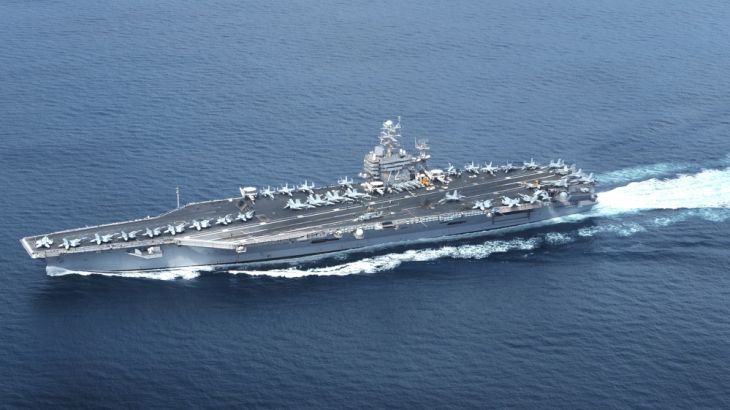
The US, Iran and global oil markets
As a US attack group steams to the Strait of Hormuz, we examine how important the world’s oil gateway is.
The Strait of Hormuz is a critical waterway to the world for Middle East oil and gas producers. Saudi Arabia, Kuwait, Iraq and Iran send tankers full of crude to clients mostly in Asia. It is also Qatar‘s main export corridor as the world’s biggest producer of gas.
About a fifth of the world’s crude passes through the narrow strait between Oman and Iran. After the United States pulled waivers for nations trading with Iran, a string of alleged attacks on tankers and drone attacks on pipelines have increased tensions.
Keep reading
list of 4 itemsWhy are nations racing to buy weapons?
Parallel economy: How Russia is defying the West’s boycott
US House approves aid package worth billions for Ukraine, Israel
To add to the mix, Washington ordered some non-essential embassy staff in Baghdad to leave and has sent a US attack group into the region.
The Americans are sending the Iranians “a mixed message at best”, explains Al Jazeera’s defence analyst Alex Gatopoulus. “It’s highly unusual that there isn’t an aircraft carrier in the region … but the announcement that they’re sending bombers and aircraft carriers sounds like it’s a ramp-up in capabilities, but actually, it’s business as usual.”
It's always possible that things evolve beyond the intention of the players because sometimes you go to war by accident, and in that case, it's very difficult to predict what might happen.
“What has changed is the rhetoric. And the rhetoric is far more bellicose than it used to be. And when you have a load of increased tension, a load of military hardware in the region, the propensity for a mistake or an accident or something intentional or otherwise that will get us into a general conflict is much higher.”
With Washington ratcheting up the pressure on Tehran, the oil markets appear to be relaxed, according to Giacomo Luciani, an expert of geopolitical energy from the Graduate Institute in Geneva.
“The market is relaxed because it’s not clear what’s going to happen and there’s significant reserves of oil in case of unintended consequences,” says Luciani. “People that are looking at this situation see an American administration that’s blowing hot and cold on alternate days. I personally don’t believe that President Trump is interested in going to war. He’s letting his security adviser threaten – hoping that this will speed up a cave in on the part of Iran. But I don’t think Iran will cave in.”
“Closing the Strait is not very easy, and secondly, it’s not necessary because tankers can be attacked anywhere in the Gulf,” says Luciani.
“This has been attempted in the past during the Iran-Iraq war, and it has not succeeded. There’s not been a serious disruption of the flow of oil out of the Gulf and I don’t think there would be a serious disruption in this case. That said, it’s always possible that things evolve beyond the intention of the players because sometimes you go to war by accident, and in that case, it’s very difficult to predict what might happen.”
Sri Lanka tourism
The devastating Easter Sunday “terror” attacks in Sri Lanka left 250 people dead. In recent days there have been reprisals on the minority Muslim community. The continued violence could make matters worse for the tourist industry in Sri Lanka.
|
|
Tourism numbers have slumped by 30 percent, according to the government. That could mean $1.5bn less for the country in foreign currency coming into the Indian Ocean island nation. Tourism accounts for five percent, or $4.4bn, of the country’s gross domestic product and supports about 500,000 jobs.
Richir Desai, a fund manager from Asia Frontier Capital, says “the [economic] repercussions that have happened after the attacks are one-off and can’t be sustained going forward and the government is taking all the steps it can to stabilise the situation on the ground and attract foreign investments.”
“The authorities are already talking about a 30 percent drop in arrivals for tourists in 2019, and over the past couple of weeks, we’ve seen numbers showing tourism’s fallen 50-60 percent. But if the government can take steps to stabilise the country and bring back the tourists by providing a better image of the country that it is safe and stable, then tourism can recover for the longer term,” says Desai.
Air taxi
The first all-electric jet-powered five-seater air taxi has taken to the sky. A Munich-based startup has beaten Uber and Google’s Larry Page to build and test a commercially viable vehicle. Lilium hopes to be ferrying people in and around our cities and beyond by 2025.
With plenty of false dawns into powered mobility vehicles, could electricity be the spark to deliver the dream?
|
|
“When we set out and built our company, we knew we’re going to create a new transportation system for the 21st century and we knew that anything else that is not electric would not responsible for this age,” explains Daniel Weigard, Lilium’s chief executive.
“The technology is equally well suited both for cities like London and New York, but also for developing countries. We’re very proud that we were able to design an aircraft which we can certify in existing regulation and also operate with pilots like any other aeroplane or helicopter. And that enables us to launch the service basically in any developed city as much as in the developing countries.”